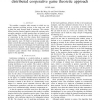Free Online Productivity Tools
i2Speak
i2Symbol
i2OCR
iTex2Img
iWeb2Print
iWeb2Shot
i2Type
iPdf2Split
iPdf2Merge
i2Bopomofo
i2Arabic
i2Style
i2Image
i2PDF
iLatex2Rtf
Sci2ools
144
click to vote
PIMRC
2008
IEEE
2008
IEEE
Spectrum sharing in multiple-antenna channels: A distributed cooperative game theoretic approach
ACT We consider a cognitive radio scenario in which two (or more) operators providing services in the same area wish to share the same licensed band of spectrum. This scenario differs from the classical cognitive setup with a primary and a secondary operators, as both operators here are instead on an equal footing. The operators face the choice of competition or cooperation in the way they choose their transmission parameters (here beamforming vectors) to communicate with their respective users. We build on interesting recently published work [5] [6] analyzing the gains of cooperation in this context and propose novel techniques for beamforming within this interference channel. The proposed techniques outperform classical non-cooperative game solutions and mimic known cooperative game solutions while introducing a distributed aspect for the algorithm.
Related Content
| Added | 01 Jun 2010 |
| Updated | 01 Jun 2010 |
| Type | Conference |
| Year | 2008 |
| Where | PIMRC |
| Authors | Zuleita Ka Ming Ho, David Gesbert |
Comments (0)

